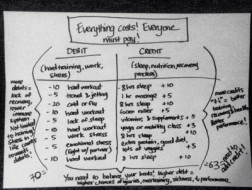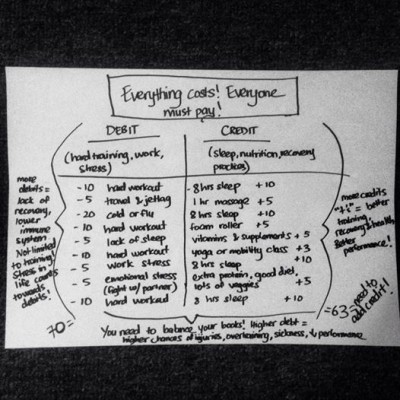Balance your bank account. A lesson in recovery.

I want to share with you a recovery analogy. This is a lesson I am still trying to learn myself and find the perfect balance with, but I wanted to write about it, as I think a lot of others could probably relate, especially those who train in CrossFit, as we tend to hit all the different energy systems fairly regularly, which can be extra physically AND mentally exhausting. There is such a fine line between giving your body sufficient stimulus for adaptation, and making sure you recover properly from the added stress.
For me, I seem to go through phases. I will get my recovery on the right track for awhile, get my immune system strong, and start making good progress, keeping tabs on everything, and then something will happen, whether it’s catching a cold that's going around, extra work stress, change in my diet or sleep, and BOOM, my recovery starts to suffer again.
I don’t remember where I first heard about the concept of Debits vs Credits in training/recovery, but it was a bit of an “aha” moment for me. It’s easy to understand Debits vs Credits in terms of money, so when you put training and recovery into that same context it starts to make more sense. I drew up a little chart/picture, which I am including below, to explain everything a bit clearer. Although I am not good at accounting or math, so please bear with me haha.
Anyway, here is how I see it. You simply must always make more money than you spend in order to stay out of debt. In the context of this post, training is a debit, and recovery is a credit.
Debits: Come from training sessions, a shitty diet (too much processed food, too little food, too many empty calories, not enough nutrients etc.), work stress or relationship problems, lack of sleep or hydration, too much alcohol or a big weekend drinking, too much joint stress etc.
Credits: Come from rest, therapy like massage and foam rolling, acupuncture, etc, sleep, good nutrition and hydration, vitamins and supplements, mobility, yoga & stretching, warm ups and cooldowns, active recovery, like walking the dog, swimming etc.
Now maybe you can see the bigger picture. For every action we must have an equal or opposite reaction. Before I go on, I have to clarify that of course not all stress is bad. For training, stress is absolutely necessary, but it is still a stessor to the body nonetheless. And every stressor on the body is a debit. Lack of recovery is what happens when you can’t make a payment. Injury comes next; you could think of injury as maxing out your credit card, or getting further into debt, and it just puts you lower down on the debit/credit ratio.
In my opinion one of the biggest credits I can make is getting proper fuel, adequate calories and good nutrition. The more we train and the more stressful our jobs and life are, the more recovery practices we need to employ. But if I am fueling my body really well over a period of time my “savings” increase and I find I can make it through extra stressful situations without going into “debt”, even if all the other aspects in my life are not always perfect (though this is the ideal it’s not always realistic). As long as I put extra importance on my nutrition and hydration, I can keep my recovery on par, or at least buy myself some time till I can get the other recovery aspects sorted again. However, if I’m not paying attention to my nutrition or if I’ve been living “paycheck to paycheck”, barely covering my withdrawals, I find any little extra stress or unexpected life situation seems to affect my health and recovery negatively.
There’s also the sleep factor. I think a lack of adequate nutritious calories is the biggest detriment for me and a lack of quality sleep is on par or a close second. Simply put, sleep IS your body’s number one mechanism for recovery. All the stretching, mobility classes, yoga, ice baths, physio appointments, massage etc. etc. simply can’t compare to just letting your system rest and repair. Sleep is when the body heals itself. I know some people spend a lot of time on “active recovery” when they would be so much better off skipping out on the active recovery jog or hike and get in some extra solid hours of sleep.
One other “credit” that I am quite guilty of forgetting myself is cooldowns after training sessions (as well as proper warmups before training, especially during winter). But cooldowns are something I really want to start including more regularly after my training sessions. Easing your body back down from maximum effort is as important as easing it into maximum effort, and this is something I’m always overlooking.
So as you can see in my little drawing below, I’ve numbered the debits and credits with a + or – and the number they are worth to me. This is just how I view each thing. Everyone is different though, and some people might find some things weigh more or less in the recovery scheme of things.
Hope you liked my bank account analogy. Let me know in the comments below if you can think of other debits or credits that really make a difference to our recovery and performance.
Join the other 10,000+ who get my best fitness, diet & mindset tips.



Comments